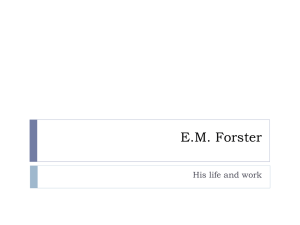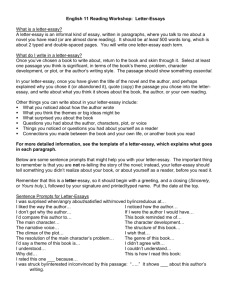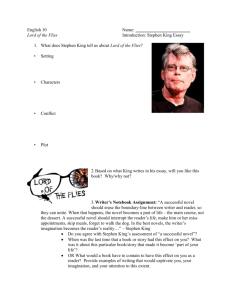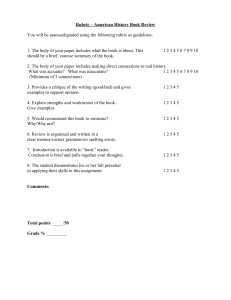Lord Byron, one of the six most famous Romantic
advertisement
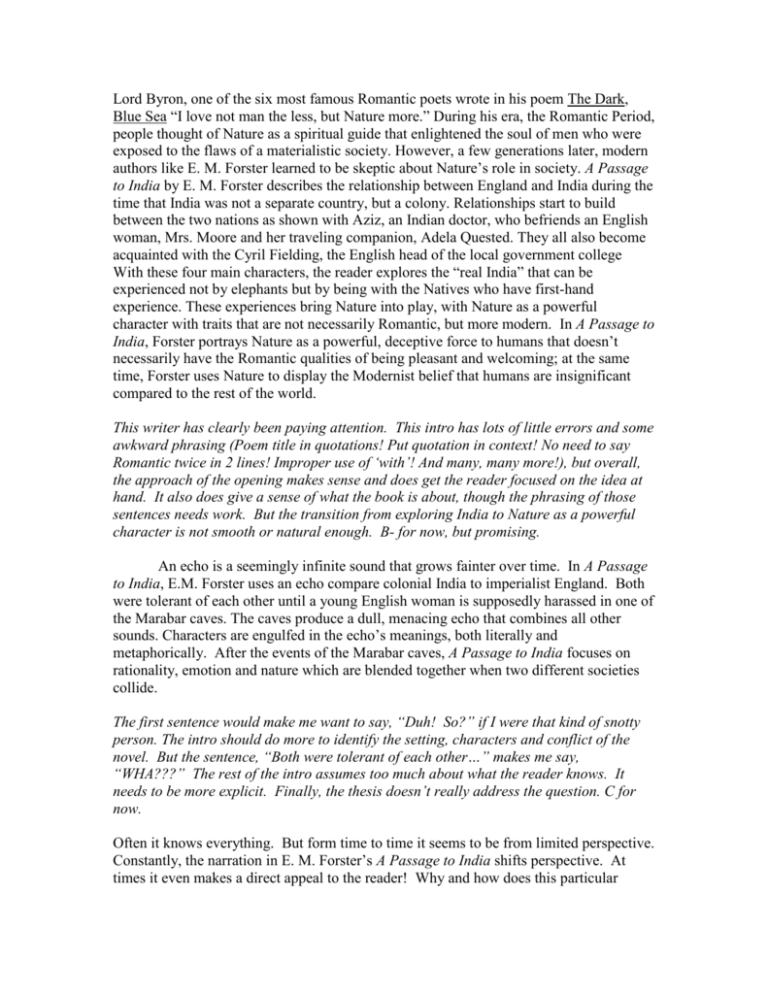
Lord Byron, one of the six most famous Romantic poets wrote in his poem The Dark, Blue Sea “I love not man the less, but Nature more.” During his era, the Romantic Period, people thought of Nature as a spiritual guide that enlightened the soul of men who were exposed to the flaws of a materialistic society. However, a few generations later, modern authors like E. M. Forster learned to be skeptic about Nature’s role in society. A Passage to India by E. M. Forster describes the relationship between England and India during the time that India was not a separate country, but a colony. Relationships start to build between the two nations as shown with Aziz, an Indian doctor, who befriends an English woman, Mrs. Moore and her traveling companion, Adela Quested. They all also become acquainted with the Cyril Fielding, the English head of the local government college With these four main characters, the reader explores the “real India” that can be experienced not by elephants but by being with the Natives who have first-hand experience. These experiences bring Nature into play, with Nature as a powerful character with traits that are not necessarily Romantic, but more modern. In A Passage to India, Forster portrays Nature as a powerful, deceptive force to humans that doesn’t necessarily have the Romantic qualities of being pleasant and welcoming; at the same time, Forster uses Nature to display the Modernist belief that humans are insignificant compared to the rest of the world. This writer has clearly been paying attention. This intro has lots of little errors and some awkward phrasing (Poem title in quotations! Put quotation in context! No need to say Romantic twice in 2 lines! Improper use of ‘with’! And many, many more!), but overall, the approach of the opening makes sense and does get the reader focused on the idea at hand. It also does give a sense of what the book is about, though the phrasing of those sentences needs work. But the transition from exploring India to Nature as a powerful character is not smooth or natural enough. B- for now, but promising. An echo is a seemingly infinite sound that grows fainter over time. In A Passage to India, E.M. Forster uses an echo compare colonial India to imperialist England. Both were tolerant of each other until a young English woman is supposedly harassed in one of the Marabar caves. The caves produce a dull, menacing echo that combines all other sounds. Characters are engulfed in the echo’s meanings, both literally and metaphorically. After the events of the Marabar caves, A Passage to India focuses on rationality, emotion and nature which are blended together when two different societies collide. The first sentence would make me want to say, “Duh! So?” if I were that kind of snotty person. The intro should do more to identify the setting, characters and conflict of the novel. But the sentence, “Both were tolerant of each other…” makes me say, “WHA???” The rest of the intro assumes too much about what the reader knows. It needs to be more explicit. Finally, the thesis doesn’t really address the question. C for now. Often it knows everything. But form time to time it seems to be from limited perspective. Constantly, the narration in E. M. Forster’s A Passage to India shifts perspective. At times it even makes a direct appeal to the reader! Why and how does this particular novel break away so dramatically from other narrations of the same time period? The narrative techniques used in A Passage to India stray from tradition by using sporadic shifts in perspective, instilling Modernist ideas of subjective truth, human insignificance, and engaging the reader in a more involved way to question and mock widely held values. I get why you’re starting with that kind of mysterious tone, but I don’t think it works well here. It might be more effective to offer an illustration of a characteristic of this narration first, and then to comment on it. After that, this intro fails to fully identify the novel, conflict, characters, etc. Questioning is not a great approach. Also, you don’t know enough about novels (not ‘narrations’) of that time period to make any sort of claim. Rather than list all the unusual things this narration does, instead focus on describing the sense of reality that exists in this novel. How does the world look to the reader of this novel? Ultimately, I’d say the thesis doesn’t say enough about what the unusual narration achieves. C for now. Through the various ‘truths’ in this novel, the viewpoints of Eastern, Western, and Modernism are not only differentiated but also united. Because the Eastern and Western mindsets are so conflicting and set against one another, it is hard to find a unifying truth between the two. In the novel A Passage to India by E.M. Forster, different truths such as verbal, mood, objective, and subjective are manifested in the concepts of the herd vs. the individual, shifting narrative perspective, and the failure of rationality and facts, which outline the Eastern and Western outlooks, as well as those of Modernism. At the point when you write the words ‘this novel,’ the reader doesn’t know what novel you’re referring to. Eastern, Western, & Modernism are not parallel! Still, the reader doesn’t know what you’re talking about. Your list of truths would also make no sense to anyone outside of our English class. The intro fails to introduce the novel or characters or plot, and lists phrases in a confusing way without explanation. This is a textbook example of ‘reader-unfriendly.’ D or worse, for now. When thinking of what is meant by term “modern”, one would guess that it meant contemporary of novel. However modernist writers are not writers that live in recent times but writers who have profound thoughts about the value of truth. They believed in not one definite truth like those of the Victorian Era, but instead of many relative truths that reveal all aspects of a grander story. There are many mediums of showing the modernist idea of truth. By deviating from standard Victorian third person narration, Forster unconventionally varies his point of view to demonstrate the idea that the single truth is derived from many relative truths and the idea that objectivity is a flawed mindset. I like the tone of the opening, but the end of that sentence doesn’t make sense. Also, I don’t think a definition of Modernism is necessary or useful for this paper—it’s a relatively well-known term. Besides, thoughts about the value of truth aren’t necessarily peculiar to nor indicative of a Modernist outlook. Please learn to use commas now and then. The next sentence makes a good point. (Media is the plural.) One glaring omission is that you completely fail to introduce the novel, the characters, the plot, the setting, the conflict. You even fail to mention the title. In fact, you mention the author’s last name as if we’d already been talking about him! You also fail to really clarify what Forster’s narrators do. Also, I wouldn’t call objectivity a mindset. Some interesting touches, but needs a lot of work C+ for now. Sigmund Freud, champion of the human mind, discovered the power of the subconscious level which acts independently of the conscious mind and therefore influences behavior in what could be considered a impulsive way. An individual may not realize the origin of his actions, because such actions have been derived from the subconscious mind and hence could be performed in what seems to be a spontaneous manner. In A Passage to India, E. M. Forster fortifies the dangers of the influential subconscious by presenting a symbolic echo that both represents the nature of the Indian world and the malleability of the mind. The characters in A Passage to India are manipulated by the stimulus of nature in India effecting their subconscious and creating a struggle between the powers in the land. India itself is a muddle: a vision enhanced by the presence of a powerful echo which presents itself as a repetitive theme, obfuscates the distinct lines of reality by haunting the subconscious mind, and is a metaphor for the power that the natural world possesses over man. This is powerfully written and has a lot of potential but also has some flaws and omissions. I like the opening idea a lot. .But there has to be a more gradual transition into the novel. There also needs to be some identification of plot and setting and conflict; for one thing, it might help to know in what context the echo occurs. The sentence that contains “symbolic echo” is a little muddy: does he fortify or emphasize the dangers? Is the subconscious influential? What does it influence? And how does the echo represent the mind’s malleability? These things just need a little thought and perhaps clarification. Not sure what ‘stimulus of nature’ means here, nor what is meant by the ‘powers in the land.’. (Note: AFFECT is the spelling of the verb here.) The thesis is impressive, but not in parallel structure. Overall, I’m impressed, and hope to be blown away in the final draft. B for now.
